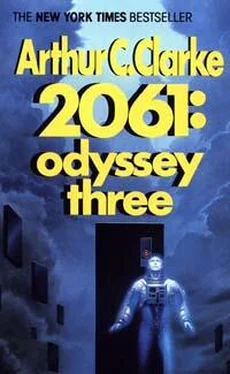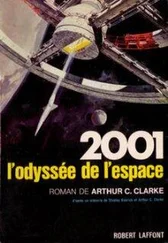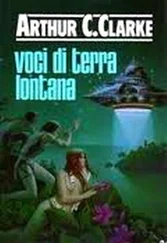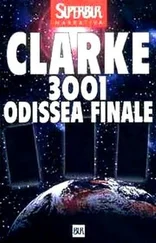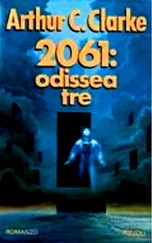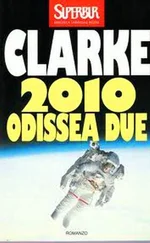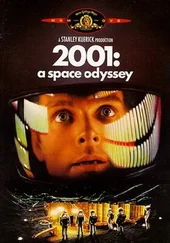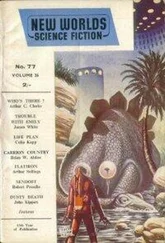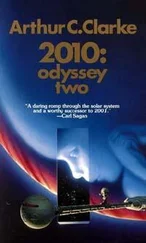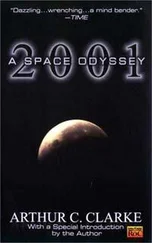Arthur Clarke - 2061 - Odyssey Three
Здесь есть возможность читать онлайн «Arthur Clarke - 2061 - Odyssey Three» весь текст электронной книги совершенно бесплатно (целиком полную версию без сокращений). В некоторых случаях можно слушать аудио, скачать через торрент в формате fb2 и присутствует краткое содержание. Жанр: Фантастика и фэнтези, на английском языке. Описание произведения, (предисловие) а так же отзывы посетителей доступны на портале библиотеки ЛибКат.
- Название:2061: Odyssey Three
- Автор:
- Жанр:
- Год:неизвестен
- ISBN:нет данных
- Рейтинг книги:3 / 5. Голосов: 1
-
Избранное:Добавить в избранное
- Отзывы:
-
Ваша оценка:
- 60
- 1
- 2
- 3
- 4
- 5
2061: Odyssey Three: краткое содержание, описание и аннотация
Предлагаем к чтению аннотацию, описание, краткое содержание или предисловие (зависит от того, что написал сам автор книги «2061: Odyssey Three»). Если вы не нашли необходимую информацию о книге — напишите в комментариях, мы постараемся отыскать её.
2061: Odyssey Three — читать онлайн бесплатно полную книгу (весь текст) целиком
Ниже представлен текст книги, разбитый по страницам. Система сохранения места последней прочитанной страницы, позволяет с удобством читать онлайн бесплатно книгу «2061: Odyssey Three», без необходимости каждый раз заново искать на чём Вы остановились. Поставьте закладку, и сможете в любой момент перейти на страницу, на которой закончили чтение.
Интервал:
Закладка:
That was not exactly a reassuring statement, but it was the best he could do. Before Willis could press the point further, he continued hastily:
'And let me remind you that any – er – slight extra risk we may be running is in the best of causes. A single hour may save lives.'
'Yes, I'm sure we all appreciate that.' Willis paused; he thought of adding 'And, of course, I'm in the same boat', but decided against it. It might sound immodest – not that modesty had ever been his strong suit. And anyway, he could hardly make a virtue of a necessity; he had very little alternative now, unless he decided to walk home.
'All this,' he continued, 'brings me to another point. Do you know what happened just a century and a half ago, on the North Atlantic?'
'In 1911?'
'Well, actually 1912 -'
Captain Smith guessed what was coming, and stubbornly refused to cooperate by pretending ignorance.
'I suppose you mean the Titanic,' he said.
'Precisely,' answered Willis, gamely concealing his disappointment. 'I've had at least twenty reminders from people who think they're the only one who's spotted the parallel.'
'What parallel? The Titanic was running unacceptable risks, merely trying to break a record.'
He almost added 'And she didn't have enough lifeboats', but luckily checked himself in time, when he recalled that the ship's one and only shuttle could carry not more than five passengers. If Willis took him up on that, it would involve altogether too many explanations.
'Well, I grant that the analogy is far-fetched. But there's another striking parallel which everyone points out. Do you happen to know the name of the Titanic's first and last Captain?'
'I haven't the faintest – ' began Captain Smith. Then his jaw dropped.
'Precisely,' said Victor Willis, with a smile which it would be charitable to call smug.
Captain Smith would willingly have strangled all those amateur researchers. But he could hardly blame his parents for bequeathing him the commonest of English names.
39 – The Captain's Table
It was a pity that viewers on (and off) Earth could not have enjoyed the less formal discussions aboard Universe. Shipboard life had now settled down to a steady routine, punctuated by a few regular landmarks – of which the most important, and certainly the most long-established, was the traditional 'Captain's Table'.
At 18.00 hours exactly, the six passengers, and five of the officers not on duty, would join Captain Smith for dinner. There was, of course, none of the formal dress that had been mandatory aboard the floating palaces of the North Atlantic, but there was usually some attempt at sartorial novelty. Yva could always be relied upon to produce some new brooch, ring, necklace, hair-ribbon, or perfume from an apparently inexhaustible supply.
If the drive was on, the meal would begin with soup; but if the ship was coasting and weightless, there would be a selection of hors-d'oeuvres. In either event, before the main course was served Captain Smith would report the latest news – or try to dispel the latest rumours, usually fuelled by newscasts from Earth or Ganymede.
Accusations and countercharges were flying in all directions, and the most fantastic theories had been proposed to account for Galaxy's hijacking. A finger had been pointed at every secret organization known to exist, and many that were purely imaginary. All the theories, however, had one thing in common. Not one of them could suggest a plausible motive.
The mystery had been compounded by the one fact which had emerged. Strenuous detective work by ASTROPOL had established the surprising fact that the late 'Rose McCullen' was really Ruth Mason, born in North London, recruited to the Metropolitan Police – and then, after a promising start, dismissed for racist activities. She had emigrated to Africa – and vanished. Obviously, she had become involved in that unlucky continent's political underground. SHAKA was frequently mentioned, and as frequently denied by the USSA.
What all this could possibly have to do with Europa was endlessly, and fruitlessly, debated around the table – especially when Maggie M confessed that at one time she had been planning a novel about Shaka, from the viewpoint of one of his thousand unfortunate wives. But the more she researched the project, the more repellent it became. 'By the time I abandoned Shaka,' she wryly admitted, 'I knew exactly what a modern German feels about Hitler.'
Such personal revelations became more and more common as the voyage proceeded. When the main meal was over, one of the group would be given the floor for thirty minutes. Between them; they had a dozen lifetimes of experience, on as many heavenly bodies, so it would be hard to find a better source of after-dinner tales.
The least effective speaker was, somewhat surprisingly, Victor Willis. He was frank enough to admit it, and to give the reason.
'I'm so used,' he said, almost but not quite apologetically, 'to performing for an audience of millions that I find it hard to interact with a friendly little group like this.'
'Could you do better if it wasn't friendly?' asked Mihailovich, always anxious to be helpful. 'That could easily be arranged.'
Yva, on the other hand, turned out to be better than expected, even though her memories were confined entirely to the world of entertainment. She was particularly good on the famous – and infamous – directors she had worked with, especially David Griffin.
'Was it true,' asked Maggie M, doubtless thinking of Shaka, 'that he hated women?'
'Not at all,' Yva answered promptly. 'He just hated actors. He didn't believe they were human beings.'
Mihailovich's reminiscences also covered a somewhat limited territory – the great orchestras and ballet companies, famous conductors and composers, and their innumerable hangers-on. But he was so full of hilarious stories of backstage intrigues and liaisons, and accounts of sabotaged first nights and mortal feuds among prima donnas, that he kept even his most unmusical listeners convulsed with laughter, and was willingly granted extra time.
Colonel Greenburg's matter-of-fact accounts of extraordinary events could hardly have provided a greater contrast. The first landing at Mercury's – relatively – temperate south pole had been so thoroughly reported that there was little new to be said about it; the question that interested everyone was:
'When will we return?' That was usually followed by: 'Would you like to go back?'
'If they ask me to, of course I'll go,' Greenburg answered. 'But I rather think that Mercury is going to be like the Moon. Remember – we landed there in 1969 – and didn't go back again for half a lifetime. Anyway, Mercury isn't as useful as the Moon – though perhaps one day it may be. There's no water there; of course, it was quite a surprise to find any on the Moon. Or I should say in the Moon.
'Though it wasn't as glamorous as landing on Mercury, I did a more important job setting up the Aristarchus Mule-train.'
'Mule-train?'
'Yep. Before the big equatorial launcher was built, and they started shooting the ice straight into orbit, we had to haul it from the pit-head to the Imbrium Spaceport. That meant levelling a road across the lava plains and bridging quite a few crevasses. The Ice Road, we called it – only three hundred kilometres, but it took several lives to build...
'The "mules" were eight-wheeled tractors with huge tyres and independent suspension: they towed up to a dozen trailers, with a hundred tons of ice apiece. Used to travel by night – no need to shield the cargo then.
'I rode with them several times. The trip took about six hours – we weren't out to break speed records – then the ice would be offloaded into big, pressurized tanks, waiting for sunrise. As soon as it melted, it would be pumped into the ships.
Читать дальшеИнтервал:
Закладка:
Похожие книги на «2061: Odyssey Three»
Представляем Вашему вниманию похожие книги на «2061: Odyssey Three» списком для выбора. Мы отобрали схожую по названию и смыслу литературу в надежде предоставить читателям больше вариантов отыскать новые, интересные, ещё непрочитанные произведения.
Обсуждение, отзывы о книге «2061: Odyssey Three» и просто собственные мнения читателей. Оставьте ваши комментарии, напишите, что Вы думаете о произведении, его смысле или главных героях. Укажите что конкретно понравилось, а что нет, и почему Вы так считаете.
